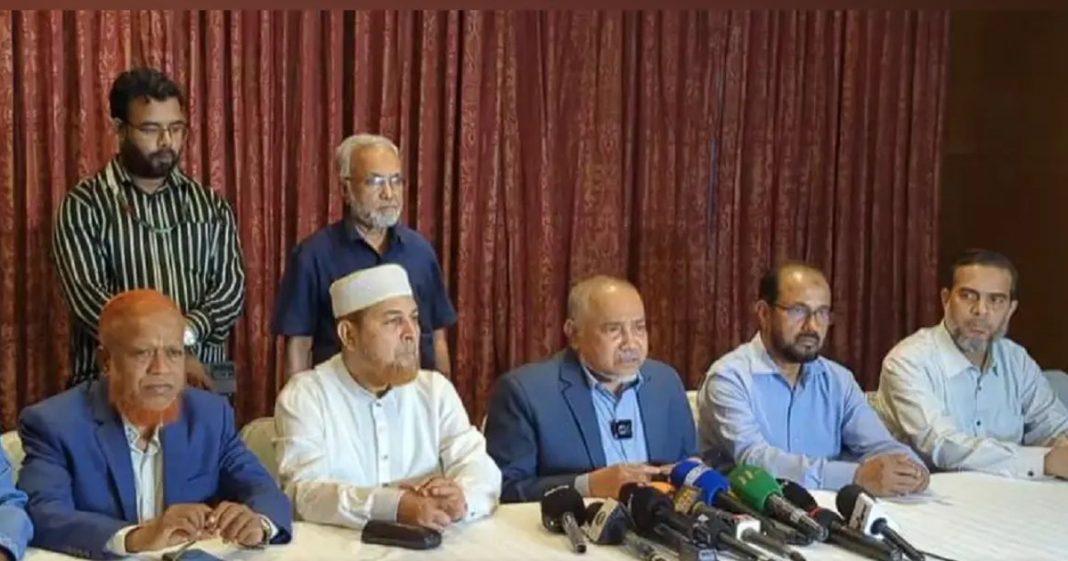Nayeb-e-Ameer of Bangladesh Jamaat-e-Islami and former MP Dr. Syed Abdullah Mohammad Taher has stated that the Rohingya refugees currently sheltered in Bangladesh are living in extremely inhumane conditions. According to him, this situation does not offer a permanent solution. The real solution lies in the repatriation of Rohingyas to their homeland, for which Jamaat-e-Islami has proposed the establishment of an independent Muslim-majority Arakan state.
On Sunday (April 27) at 5 PM, a meeting was held between a delegation from Bangladesh Jamaat-e-Islami and a visiting delegation from the Communist Party of China (CPC) at Hotel Westin, Dhaka. During the meeting, Jamaat-e-Islami formally presented the proposal for the creation of a new independent Arakan state to the CPC representatives.
Speaking at a press conference after the meeting, Dr. Taher said, “We had an open discussion with the CPC leaders. Last December, we visited China at the invitation of the Chinese government, which was largely an official trip. However, today’s meeting was more of a party-to-party dialogue.”
Highlighting China’s rising global influence, Dr. Taher said, “China is an emerging force in global politics, economy, and international relations. Since Jamaat-e-Islami is an inclusive, democratic, and liberal party, we believe in building good relationships at both government and non-government levels. Today’s meeting aligns with that policy.”
He added that the CPC leaders invited Jamaat’s chief adviser for future visits and expressed willingness to sign certain agreements and provide assurances, for which Jamaat expressed gratitude. Dr. Taher emphasized that China is now Bangladesh’s largest investor and requested expanded investments, particularly mentioning the Teesta Barrage project and a second Padma Bridge. He also proposed Chinese funding for deep-sea port projects to boost Bangladesh’s blue economy.
Regarding regional security, Dr. Taher said they discussed the importance of maintaining balanced security so that no country can intimidate another. He also requested more scholarships for Bangladeshi students, to which the CPC representatives responded positively and promised to notify their government.
Dr. Taher mentioned, “We hope that relations between the Chinese government and Jamaat-e-Islami will strengthen at multiple levels: government-to-government, party-to-party, and people-to-people.”
Addressing the Rohingya crisis, Dr. Taher stressed that the current situation in Bangladesh is unsustainable, with around 11 to 12 lakh (1.1 to 1.2 million) Rohingyas living in harsh conditions. He proposed the formation of an independent Muslim-majority Arakan State as a permanent solution, suggesting China could play a significant role given its strong ties with Myanmar.
He added, “If an international repatriation committee is formed, the crisis could be resolved collectively. We have recommended the creation of a Muslim Arakan State, and the CPC delegation has assured us that they will present this proposal to the Chinese government and pursue possible initiatives.”
Discussions also covered ongoing political reforms and upcoming elections in Bangladesh. Dr. Taher stated that Jamaat expressed their reform proposals to the CPC. Referring to the upcoming national elections, he said the interim government’s chief adviser has suggested December or, with further reforms, by next June, for elections — a timeline Jamaat supports.
When asked about China’s view on Bangladesh’s elections, Dr. Taher clarified that the CPC representatives refrained from commenting directly, maintaining that China does not interfere in the internal matters of other countries but supports programs and policies that foster cooperation.
Other Jamaat-e-Islami leaders present at the meeting included Assistant Secretary General Maulana Rafiqul Islam Khan, Advocate Ehsanul Mahbub Zubayer (Central Executive Committee Member), Advocate Matiur Rahman Akand (Secretary of Central Publicity and Media Division), Nurul Islam Bulbul (Ameer of Dhaka Metropolitan South), and Mohammad Selim Uddin (Ameer of Dhaka Metropolitan North).

